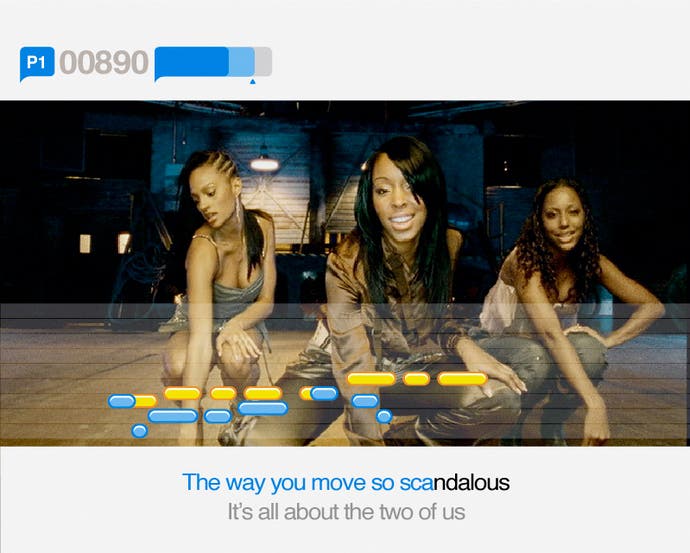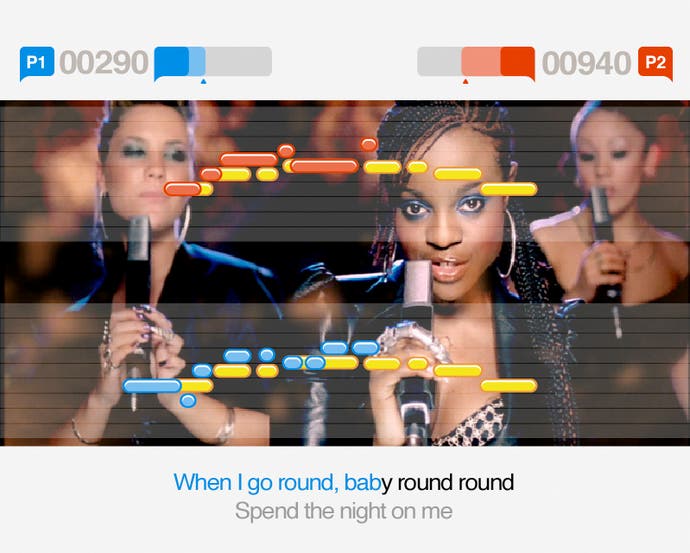SingStar
We're caught in a trap. We can't walk out. Because we love this too much baaaabyyyyeyeaheyeah.
Order yours now from Simply Games.
Up to the point that we first listened to ourselves, caught up in the vein-popping throes of Avril Lavigne's skater anthem 'Complicated' in a roomful of intoxicated friends, it had never quite sunk in that our singing voices are such a screeching catastrophe of never-quite-notes and vocoder-ish octave hopping. And yet the disappointment of this discovery didn't last long, because, believe it or not, our increasingly desperate efforts to scale the peaks and plough the troughs of the Canadian's towering vocalisations quickly proved to be the funniest thing to hit the lounge since a brick through the window with a Tommy Cooper DVD strung round it.
Not being able to sing is probably the best possible reason to buy SingStar. Because, even if we can't sing, we still do. In the car. In the shower. In front of the PC. Late at night as we listen on our headphones. We needn't have just walked off the set of Pop Idol with Simon Cowell's marriage proposal in our back pocket to drag a single to the top of the charts and score highly in SingStar. In fact, that's probably a given...
That's the single

Ostensibly SingStar is karaoke with a scoring system. We plug in the pair of supplied microphones (chunky, suitably heavy red and blue instruments with SingStar logos and a little USB adapter), pick a difficulty level and one of the game's 30 songs and then sing along to the words on the screen. As we do this, a video for the song plays in the centre of the screen while a series of narrow grey lines pops up in the foreground for each lyric - the idea being that these lines represent the relative positions of the various notes we're attempting to hit, acting as a kind of visual cue and also demonstrating how close we are to being in tune.
As we sing, they fill up with our respective colours. Except, whenever our voice wavers off key, our colour spills outside the top or the bottom of the grey lines, giving us an idea which way we need to go to get back on track - and, by narrowing the boundaries of what's acceptable and treating us fractionally more harshly, the game bends this system into a trio of difficulty levels. It's an ingenious way of doing it, actually, and it's not just geared to musically minded people either. The lines aren't staves; we couldn't read them musically - and yet after a while we could almost tell from the screen which note we were expected to hit even if we couldn't name it.
Except (and here comes the clever bit), we're not actually expected to hit the notes. All we have to do is occupy the same pitch. It doesn't matter whether we're in a higher or a lower octave, and in fact we found with 'Complicated' amongst others that our vocal range doesn't quite stretch high or low enough in certain areas, forcing us to leap up and down mid-lyric as though our testicles were being crushed by some unseen foe. (Or, for the ladies in the audience, as though someone was dangling a mouse in front of us every time Avril tried to get Complicayatayed.)
Comedy gold
When the song's finished, the game offers a score based on how well we stuck to the grey bars, and also how many Golden Notes we hit. Golden Notes? Ah yes - at intervals during the song, particularly tricky notes are emphasised with a sparkling effect, and managing to successfully capture one of these within the framework of the general caterwauling is good for a bonus. The overall score benefits from these, but it isn't until we hit the Playback button that our accomplishment truly sinks in. And we go ahead and save it to the memory card.
In Playback mode, as our voice is replayed over the top of the tune and the full gravity of what we've done starts to sink in, cringing embarrassment clambers all over us, which quickly gives way to creeping amusement, then, as we tinker with the special effects like the 'baby' voice and 'deep daddy', switch the actual singer on and off, and raise and lower the volume of your voice with the shoulder buttons, finally the roaring, tear-jerking laughter that's been building inside consumes us completely - along with everybody else in the room. It's never quite as good as the first time, but there are lots of different songs to explore, and it's an intoxicating comedy high. Look at me! I'm a total idiot and I love it!
In that respect, SingStar is the definitive social game. The less inhibited of our friends will bask in the spotlight from the get-go, whilst the insecurity and macho facades lingering on the sidelines will eventually crumble and join in. There are songs more or less everybody can appreciate - the full listing runs from the likes of Petula Clark (Downtown), A-Ha (Take On Me) and Elvis (Suspicious Minds) through the likes of Carl Douglas (Kung Fu Fighting), Roy Orbison (Pretty Woman) and Madonna (Like A Virgin), and right up to a mixture of songs from the present day - The Darkness (I Believe In A Thing Called Love), Westlife (World Of Our Own), S Club (Don't Stop Movin'), Sugababes (Round Round), Lemar (50/50), and even Jamelia (Superstar).
Groove is in

SingStar's 30 songs really do probe most crevices, and although the reaction to the listing is always bound to be very subjective, it's hard not to find at least a handful of recognisable songs, whether we're after karaoke classics like YMCA, we fancy growling like a motorcycle to Ace of Spades, or we just want to shatter fine china with renditions of Heart of Glass, Daniel Bedingfield's If You're Not The One, and Groove is in the He-aaaaaaaarrrr-ah-ah-ah-aaaaahhht.
If we're feeling particularly adventurous, we can even plug in EyeToy and watch ourselves as we sing before delving into eight video snapshots afterward. These are recorded whenever an EyeToy logo pops up on the screen, and although sadly it's not possible to save them anywhere, they add even more humour and value to the proposition - after all, who doesn't want to see their own spontaneous dance moves brought to life, and laugh along to ill-considered hip-jiggling and pelvic thrusts? (Just thank various deities we didn't upload any recordings...)
It's even been built to cater to single players. Although we wouldn't advise anybody to buy this unless we were confident they could get at least one other person to join in, the 'Star Maker' mode more than adequately passes the time, chronicling progress from club singer to aspiring chart-topper and beyond as we perform in various venues (unlocked at intervals, each with its own set of songs) and try and guide the song we sing best (often enough Jamelia's middling Superstar, interestingly and annoyingly) to the top of the charts as a single. There's a bit too much repetition of the same songs, and it's not exactly suspending disbelief to receive endless text messages on a virtual mobile phone offering advice about the amount of 'buzz' (points) we're generating, but it's a diversion from the monotony of another night in with Top Of The Pops repeats.
We got served
For all the laughter and entertainment though, SingStar isn't without its flaws. Obviously chief amongst these is that the soundtrack only tries to please everybody some of the time, but although we can't quite understand why Atomic Kitten's version of Eternal Flame is somehow superior to any other, or how Lemar's 50/50 actually constitutes a piece of music (we've yet to 'sing' it convincingly), it's forgivable. (And we fancy it won't be long before Sony and Studio London decide to cash in on the game's popularity by releasing different genre packs - and for once actually we hope they do.)
However there are some things that are less forgivable. After a while we noticed that the timing is fractionally off on playback, and that the way the singing is scored often demands that we hold onto a note a little bit longer than feels natural. Worse, those fluttering little vocal embellishments everybody enjoys emulating are ignored by the game's scoring system, meaning that we were actually penalised rather than celebrated for attempting to strum our vocal chords like a proper singer. Presumably that explains the absence of Christina Aguilera songs.
In fact, the way the game reacts to singing can be quite irritating at times - preferring quick sharp tapering to bending and drooping vocalisations - and sometimes its choice of the right vocal path can also stick in the throat. Singing along to Mis-Teeq's Scandalous at one point (a rare admission there), the chorus harmony proved completely elusive. Not because we were failing any more than usual, but because the game had picked one aspect of the three-singer harmony to be the right response, and mentally we'd clearly chosen another. It's often quite simple to leap up or down an octave, but shifting between individual parts of a harmony is something else entirely.
Star material
Perhaps the worst problem though was the way the song and the scoring system occasionally slipped out of sync by around half a second. In fact this happened three times during the process of playing the game for this review, seemingly because the video and audio jerked momentarily while the grey bars raced on ahead unhindered. So, while we were happily singing along to Suspicious Minds, the game was attempting to generate a score as if we were singing lyrics half a second too late. Not the end of the world during a muck about, but actually quite a serious problem when we're competing in the single-player game - which cuts out the 'restart song' option.
But is it strictly speaking the developer's fault? We could argue that it's just fingerprints on the disc, or that our creaky PS2 isn't up to the task any more, but at the same time there's a feeling that for something that relies so completely on audio/visual synchronisation there was call for a bit of foresight in this department.
Then again, we wouldn't want to detract too much from the magnificence of Studio London's accomplishment. It truly is a watershed for the party game genre. Apart from simply being an impressive technical accomplishment, it's also buffed, polished and arranged to generate the maximum degree of entertainment. Everything, from the simple and pleasantly minimalist interface to the tunes in the virtual jukebox and the facility to integrate with EyeToy, seems like a masterstroke. The multiplayer options - our favourite being 'battle', which has two players singing along together and tallies the scores separately - are bound to prove popular, and even without them it's perfectly geared towards groups of all ages. In fact, a few minor blemishes aside, it really has raised the bar for social gaming, and arguably it's given karaoke a new home. Better yet, it didn't even have to hit the high notes to do so. Quite frankly, we want more, and that's always the sign of a game playing the right tune.
Order yours now from Simply Games.








